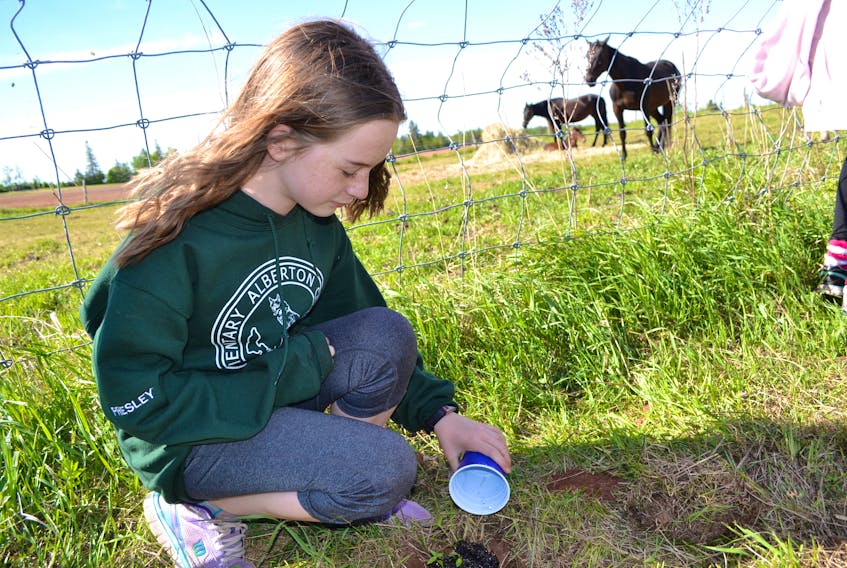ALBERTON
If it were not for the dark potting soil mixture around them, the tiny milkweed plants students from Alberton Elementary School helped plant along a fence line Wednesday would be hardly noticeable among the vegetation around them.

But those tiny plants hold great promise for a common species of butterfly, the Monarch.
“It is a plant that the caterpillars eat to turn into Monarch butterflies,” explained Grade 6 student Presley Profit, as she gently patted down the soil around a freshly planted milkweed and gave the plant a drink of water.
The planting project was a joint undertaking with the Town of Alberton and the Cascumpec Bay Watershed Group. The tiny plants were placed in the soil by Grade 5 and 6 students. For the graduating students, at least, to see the fruits of their labour will require a special trip to the school playground.
Summer vacation will be well underway by the time the plants bloom and the Monarchs show up to lay their eggs.
Leona Lane, a volunteer with the Cascumpec Bay Watershed Group, explained that Monarchs can feed on other plants but their larvae only feed on the milkweed.
“It’s really neat they get the chance to be outside planting these milkweed plants, plus getting filled in with all the information,” said teacher Robert MacNaught.

“They are going to remember this for a long time,” he said. “Most of the kids never heard the word milkweed before in their life and, all of a sudden now, I don’t think they will ever forget it.”
“We’re working on the principle of, ‘when we learn we care,’” said Lane. “That’s why we’re involving the elementary school children, the Grade 5s and 6s, because, when they do this and they care for the Monarch, and they realize the Monarch is in trouble with its numbers, then they will care about others; when they hear about other creatures that are in danger, they will care more.”
John and Leona Lane from the Watershed Group, along with horticulturalist Garth Davey who is the town’s maintenance officer, gave a milkweed/Monarch butterfly presentation to the students a month ago. The trio also obtained from the Department of forestry a clump of what they hoped would be about 200 milkweeds. By the time they separated the plants, they counted close to 400. About half of that number were planted at the back of the playground near a horse pasture while others were to be planted around town and near streams.
“If these plants grow as they should, and bloom as they should; if there are Monarchs in the area, they will find it and they will actually eat on it this year and lay their eggs on it this year,” Lane described the goal of the project.
Milkweed was once common on P.E.I., in ditches and in hedgerows, but, with ditches cut back and many hedgerows removed, Lane said the plants are no longer common and, as a result, neither is the Monarch.

Forest fires and climate change is also impacting the Monarch and its habitat in other parts of the world, MacNaught added.
The plants are easy to grow, said Davey, noting they grow in both moist and dry soil.
He’s hoping students will drop by over the summer to witness the arrival of the butterflies and to view the stages in the butterfly cycle from egg to larva (caterpillar) to pupa or chrysalis stage, out of which an adult butterfly will emerge.
Davey said he hopes to help develop a wild garden for students’ enjoyment along the uncut edge of the playground.









